Dental work in Mexico can save you thousands of dollars without compromising on quality. In 2025, patients from the United States and Canada are discovering that they can receive world-class dental care at 50 to 80 percent less than typical U.S. prices, with many procedures costing only a fraction of what they would pay at home.
More than a million Americans cross the border each year for dental treatment, drawn by the mix of affordable prices, modern equipment, and skilled professionals. Whether you need a simple cleaning or a complete mouth restoration, knowing what dental care costs in Mexico helps you make an informed, confident decision about your oral health.
This comprehensive guide explains what you will pay for common dental procedures in Mexico, compares prices across destinations, and gives you practical details to plan your dental tourism trip effectively.
Mexico Dental Costs Overview: How Much You Can Save
The cost savings for dental work in Mexico are significant and immediate. In 2025, patients typically save 50 to 80 percent compared to U.S. prices, and some treatments deliver even greater savings. For major procedures like dental implants or full mouth restoration, it is common to save $5,000 to $15,000 or more.
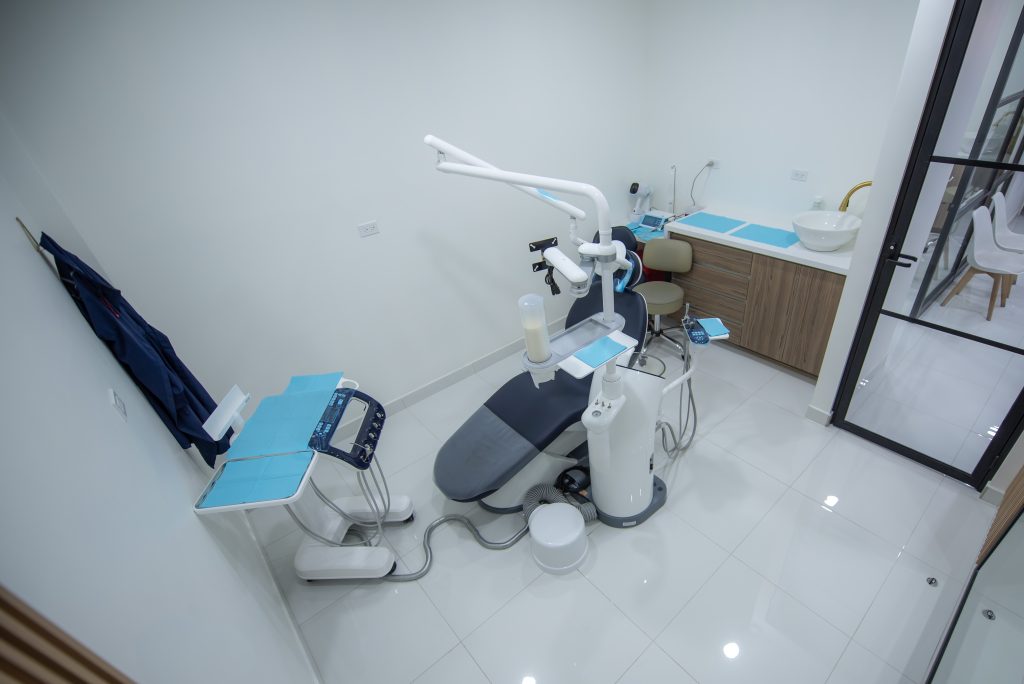
These savings come from lower operational costs, a competitive market, and favorable exchange rates, and they do not require a trade-off in quality. Many clinics in Mexico use the same modern equipment and technology you find in top U.S. offices, and many dentists have training linked to American Dental Association programs or international institutions.
The average cost savings across popular procedures include:
- Dental implants: save $1,500 to $2,500 per implant
- Porcelain crowns: save $900 to $1,900 per crown
- Veneers: save $650 to $1,400 per tooth
- Root canal treatment: save $600 to $1,150 per procedure
- Full smile makeover: save $10,000 to $30,000 for a complete treatment
For patients who need extensive dental work, these savings can make previously out-of-reach care accessible. A complete upper or lower arch restoration that might cost $25,000 to $35,000 in the U.S. can often be completed in Mexico for $8,000 to $12,000, travel expenses included.
Detailed Dental Treatment Prices in Mexico (2025)
The following comprehensive breakdown shows current Mexico dental treatment cost ranges alongside US comparisons:
| Procedure | Mexico Cost (USD) | US Cost (USD) | Savings |
|---|---|---|---|
| Dental Cleaning | $35-$60 | $100-$200 | 65-70% |
| Dental Consultation | $0 | $150-$300 | 100% |
| Composite Filling | $60-$120 | $150-$400 | 60-70% |
| Porcelain Crown | $300-$600 | $1,200-$2,500 | 75-76% |
| Porcelain Veneers | $350-$600 | $1,000-$2,000 | 65-70% |
| Root Canal | $199-$350 | $800-$1,500 | 75-77% |
| Tooth Extraction | $50-$100 | $150-$400 | 67-75% |
| Dental Implant (Single) | $750-$1,200 | $3,000-$5,000 | 75-76% |
| All-on-4 (per arch) | $8,900-$11,000 | $15,000-$28,000 | 41-61% |
| Dentures (Full Set) | $350-$800 | $1,200-$3,000 | 70-73% |
| Teeth Whitening | $150-$300 | $400-$800 | 63-75% |
These Mexico dental prices reflect care at accredited clinics with modern facilities and experienced dentists. Prices can vary based on the clinic’s location, the dentist’s experience, and the complexity of your case.
Dental Implant Costs in Mexico
Dental implants deliver one of the most significant savings opportunities in Mexico. A single dental implant, including the implant, abutment, and porcelain crown, typically costs $750 to $1,200 in Mexico compared to $3,000 to $5,000 in the U.S.
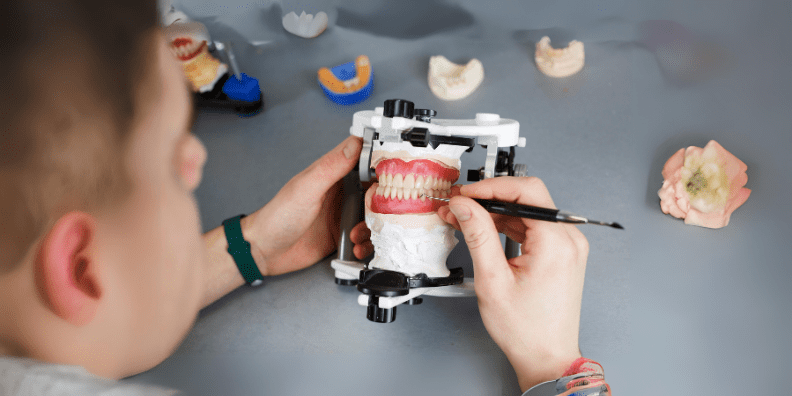
Single Implant Breakdown:
- Titanium implant placement: $400-$650
- Abutment: $150-$250
- Porcelain crown: $200-$300
- Total per tooth: $750-$1,200
Full Mouth Implants Solutions:
- All-on-4 (per arch): $8,900-$11,000
- All-on-6 (per arch): $11,000-$14,000
- All-on-8 (per arch): $14,000-$17,000
Additional Implant-Related Costs:
- Bone graft: $250-$600 per area
- Sinus lift: $600-$1,200
- Extraction per tooth: $50-$100
- Temporary denture: $300-$600
If you prefer premium systems such as Nobel Biocare or similar brands, pricing may be 20 to 30 percent higher, yet it still represents substantial savings versus U.S. fees. Many clinics offer financing and payment plans to keep treatment accessible.
Cosmetic Dentistry Prices
Cosmetic dentistry in Mexico offers excellent value for patients seeking smile makeovers or aesthetic improvements. The combination of affordable pricing relative to the U.S. and high-quality care makes Mexico an attractive destination for cosmetic dental work.
Veneer Options:
- Porcelain veneers: $450-$600 per tooth
- Composite veneers: $350-$550 per tooth
- Ultra-thin lumineers: $500-$700 per tooth
- Porcelain fused to metal: $300-$500 per tooth
Complete Smile Transformations:
- Full smile makeovers (8-12 veneers): $3,500-$6,000
- Full smile makeover (14-16 veneers): $5,500-$8,500
- Smile makeovers with crowns and veneers: $4,000-$9,000
Other Cosmetic Procedures:
- Professional teeth whitening: $150-$300
- Gum contouring: $200-$400 per area
- Composite bonding per tooth: $80-$150
These savings often allow patients to upgrade to premium materials, such as all porcelain or zirconia restorations, which might be cost prohibitive in their home country.
General Dentistry Costs
Routine cleanings and general dentistry procedures are the foundation of dental tourism, and many patients combine preventive care with more extensive treatments during the same visit.
Preventive Care:
- Dental cleaning (prophylaxis): $35-$60
- Deep cleaning (scaling/root planing): $200-$400 per quadrant
- Fluoride treatment: $25-$45
- Dental X-rays (full set): $60-$120
Restorative Procedures:
- Composite fillings: $60-$120 per tooth
- Amalgam fillings: $40-$80 per tooth
- Inlays/onlays: $200-$400 per tooth
Emergency Dental Care:
- Emergency consultation: $75-$150
- Pain management treatment: $100-$200
- emergency tooth extraction: $75-$125
Orthodontic Options:
- Traditional braces: $1,500-$3,000
- Clear aligners (Invisalign-style): $2,000-$4,000
- Retainers: $200-$400
These affordable prices make it practical to pair routine care with vacation travel, especially for patients living in border states.
Dental Tourism in Mexico: How Costs Compare and What to Expect
For many patients from the United States and Canada, dental tourism in Mexico starts with one simple question: how far will their budget really go if they cross the border for care?
When you look beyond the headlines, you will usually find that patients can access similar or higher quality treatments at significantly lower prices, especially for implants, full mouth restorations, crowns, and cosmetic work. Lower operating costs, competitive local markets, and the strength of foreign currencies often combine to make complex procedures more accessible without sacrificing safety or materials.
Once patients understand the numbers, many begin planning a full dental vacation in Mexico, combining their treatment with a short break to rest, recover, and enjoy a change of scenery. In locations like Los Algodones, clinics, pharmacies, and hotels are close to each other, so it is easy to schedule appointments, adjust your treatment plan if needed, and still have time to relax. The key is to choose a clinic that offers transparent pricing, clear treatment plans, and honest guidance about recovery times, so you can organize flights, hotel stays, and follow-up visits with confidence.
Cost Differences by Mexican Dental Destinations
Location has a direct impact on dental prices in Mexico. Border towns typically offer the lowest costs, while beach destinations tend to charge premium rates. Understanding these differences helps you choose the best value for your needs.
Border Town Advantages
Los Algodones (nicknamed Molar City) offers one of the highest concentrations of dental offices, with hundreds of dentists serving a town of about 5,000 residents. Located just minutes from the U.S. border, it provides:
- Lowest dental costs in Mexico
- Easy access from California and Arizona
- No resort markups or tourist pricing
- Strong competition that keeps prices down
- Average savings: 70 to 80 percent compared to the U.S.
Tijuana features a large selection of clinics and specialists, with costs typically 10 to 15 percent higher than Los Algodones yet still offering exceptional value:
- Broader specialist options and services
- More luxury clinics to choose from
- Easy access from San Diego
- Modern facilities with current technology
- Average savings: 65 to 75 percent compared to the U.S.
Other Notable Border Destinations:
- Nuevo Progreso, Texas border: Small town pricing, limited options
- Mexicali: Growing dental hub, competitive rates
- Nogales: Convenient from Arizona, moderate pricing
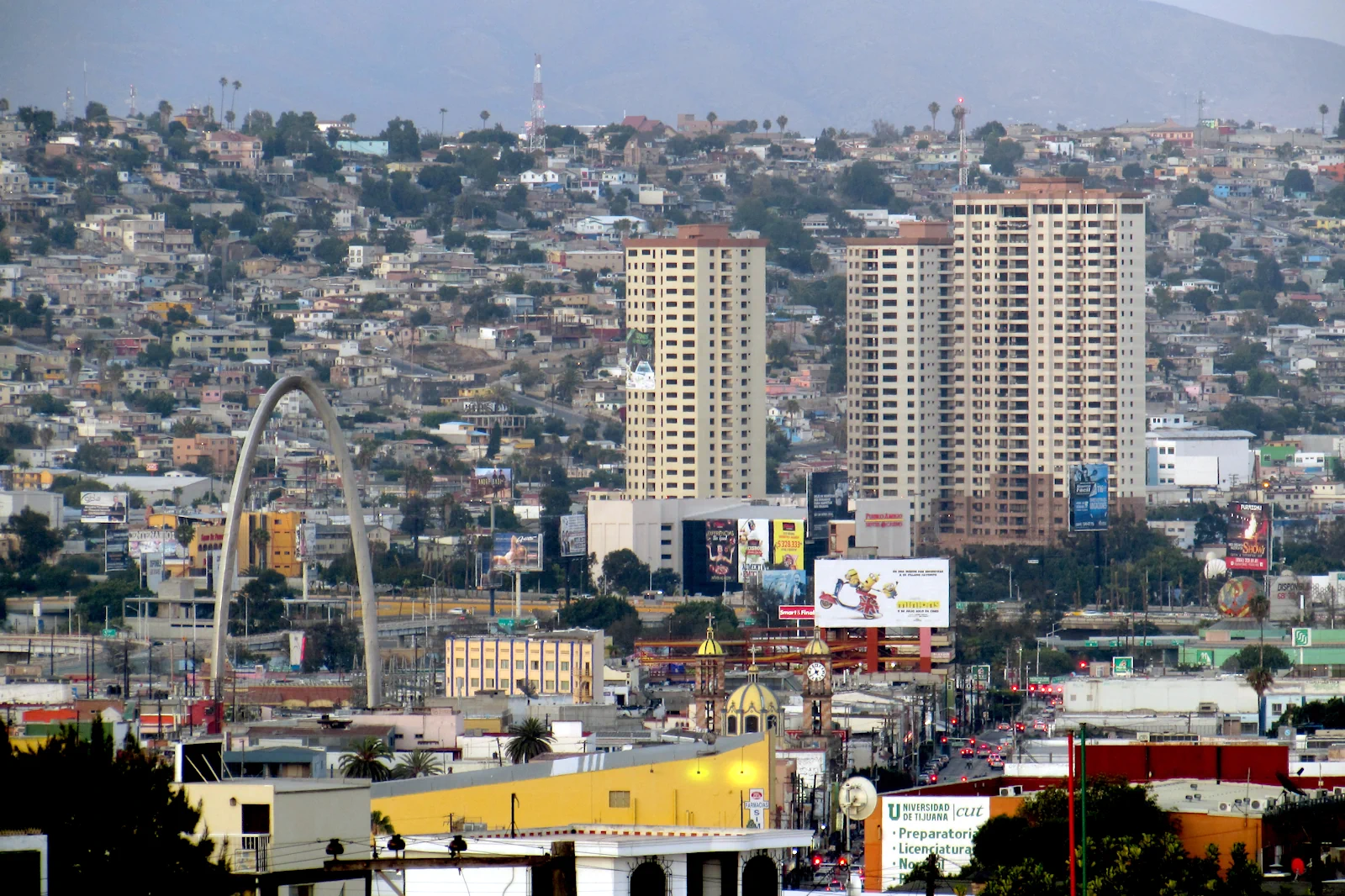
Beach Destination Dental Tourism
Resort destinations offer a different value proposition, combining dental treatment with vacation experiences, though overall costs are higher.
Cancun provides premium facilities in a vacation atmosphere:
- 20 to 30 percent higher costs than border towns
- Luxury clinic settings
- Tourist friendly infrastructure
- Easy international flight access
- Combined treatment and vacation packages
Puerto Vallarta offers cultural attractions with moderate pricing:
- 15 to 25 percent higher than border towns
- Beautiful coastal setting
- Good restaurant and accommodation options
- Growing number of quality dental clinics
Los Cabos delivers luxury dental tourism experiences:
- Premium pricing, 25 to 35 percent above border towns
- High end resort partnerships
- Exclusive clinic facilities
- Concierge style patient services
The cost versus experience trade off depends on your priorities. Border towns maximize savings, while beach destinations combine treatment with vacation experiences.
Why Dental Work Costs Less in Mexico
Mexico’s lower dental costs are driven by structural and economic factors, which explains how quality care stays affordable.
- Lower Operating Costs: A lower cost of living reduces practice overhead. Office rent, utilities, and general expenses are often 60 to 70 percent lower than comparable U.S. locations. This lets clinics maintain modern facilities while keeping prices accessible.
- Reduced Labor Costs: Dentist and staff wages are lower in Mexico, without implying lower skill. Many qualified professionals choose Mexico for lifestyle and to serve dental tourism. Lower education costs also reduce the debt pressures that affect U.S. pricing.
- Minimal Regulatory Overhead: Rigorous training and licensing exist, yet administrative expenses are lighter than in the U.S. Malpractice insurance requirements are lower, and compliance costs are reduced.
- Currency Exchange Benefits: A favorable dollar to peso exchange rate provides extra savings for American and Canadian patients. Depending on market conditions, this can add 10 to 20 percent to overall savings.
- Competitive Market Environment: High clinic density increases competition, especially in Los Algodones. Patients have many options, which pushes prices down while encouraging consistent quality.
- Government Healthcare System: Public healthcare reduces cost pressures on private practices. Clinics do not need to offset complex insurance administration or large volumes of uninsured patients to the same degree as many U.S. offices.
Payment Options and Insurance Coverage
Most clinics are set up for international patients, with flexible payment methods and clear processes for visitors from the U.S. and Canada.
Accepted Payment Methods:
- U.S. dollars, cash, often preferred with small discounts
- Major credit cards, Visa, MasterCard, American Express
- PayPal and digital platforms
- Bank transfers for larger treatments
- Financing plans through clinic partnerships
Credit Card Processing: Most clinics accept credit cards and may add a 3 to 4 percent processing fee. Some offer cash discounts to offset fees. Confirm payment terms before treatment begins.
Dental Insurance Reimbursement: Many U.S. plans do not cover out of network international care, but partial reimbursement may be possible if you submit proper documentation:
- Itemized bills and treatment records
- Accurate diagnostic codes, CDT codes
- Digital X rays and treatment photos
- Expect 30 to 60 percent of in network reimbursement rates
Required Documentation:
- Detailed treatment plans with CDT codes
- Digital X rays and clinical photos
- Dentist credentials and clinic information
- Itemized receipts on clinic letterhead
Health Savings Accounts: HSA and FSA funds are often eligible for qualified dental care in Mexico. Verify details with your plan administrator.
Hidden Costs and Fee Transparency
Knowing every potential fee helps you budget well and avoids surprises during your trip.
Common Additional Fees:
- Initial consultation: $50 to $150, often credited toward treatment
- Digital X rays: $60 to $120 for a full mouth series
- 3D CBCT scans: $150 to $300 for implant planning
- Temporary denture during healing: $300 to $600
- Follow up visits: $50 to $100 per visit
Treatment Specific Costs: For complex care like full mouth restoration, additional costs may include:
- Laboratory fees for custom prosthetics
- Accommodation for multiple visits
- Healing time between procedures
- Adjustment appointments
Travel and Accommodation Expenses: Include these in your total budget:
- Flights or fuel if you drive to the border
- Hotel accommodations: $40 to $150 per night
- Meals and incidentals: $30 to $80 per day
- Border crossing fees and parking
- Local transportation

Red Flags to Avoid:
- Unusually low prices that seem too good to be true
- Pressure to commit immediately without time to research
- Clinics without proper licensing or accreditation
- No clear warranty or follow-up policies
- Lack of English-speaking staff for international patients
Transparency Best Practices: Reputable clinics provide detailed written estimates, explain all potential additional costs, and offer clear warranty terms. Always request a comprehensive treatment plan with every cost itemized before you begin any procedure.
Best Value Dental Destinations in Mexico
Choose a destination that balances cost, convenience, quality, and your preferences. Each major dental tourism hub offers distinct advantages for different needs.
Los Algodones: Maximum Savings
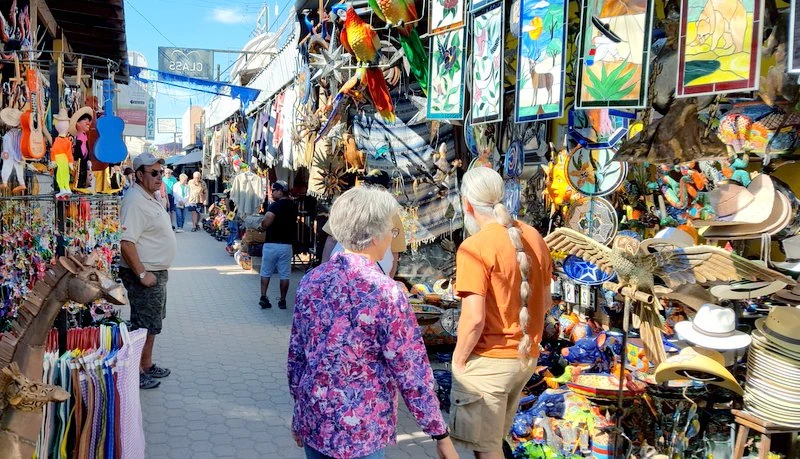
Known as Molar City, Los Algodones has the highest concentration of dentists per capita and the lowest dental costs in Mexico. This small border town of about 5,000 residents hosts over 600 dentists within a compact area.
Advantages:
- Lowest prices in Mexico
- Five-minute walk from the U.S. border
- No visa required for brief visits
- Intense competition keeps rates low
- Easy day trips from Southern California and Arizona
Typical Savings:
- Single implants: $700 to $1,000 vs $3,500 to $5,000 in the U.S.
- Crowns: $280 to $450 vs $1,500 to $2,200 in the U.S.
- Full dentures: $350 to $600 vs $1,500 to $2,800 in the U.S.
Best For: Budget-conscious patients, simple procedures, day visits, comparing multiple treatment plans
Tijuana: Largest Selection and Services
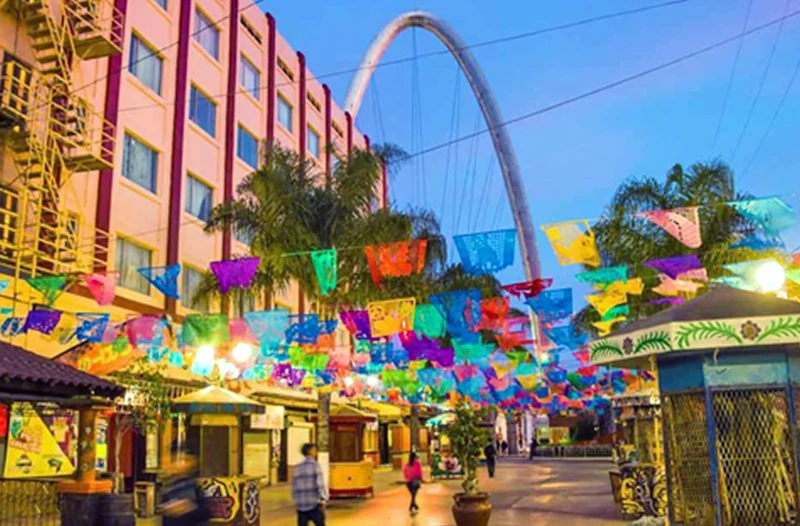
Tijuana offers the widest variety of specialists and clinics, serving international patients with over 400 practices. Close proximity to San Diego makes access easy, and the city provides more comprehensive services than smaller border towns.
Advantages:
- Largest selection of specialists
- Modern facilities with current technology
- Multiple treatment options and second opinions
- Cultural attractions and dining
- Airport access for international travelers
Cost Range:
- Typically 10 to 15 percent higher than Los Algodones
- Still 65 to 75 percent less than U.S. treatment
- Premium options available for luxury experiences
Best For: Complex procedures, specialist care, patients wanting many options, longer treatment plans
Beach Destination Dental Tourism
Resort destinations combine treatment with a vacation experience, though costs are higher than in border towns.
Cancun: Premium Facilities and Vacation Atmosphere
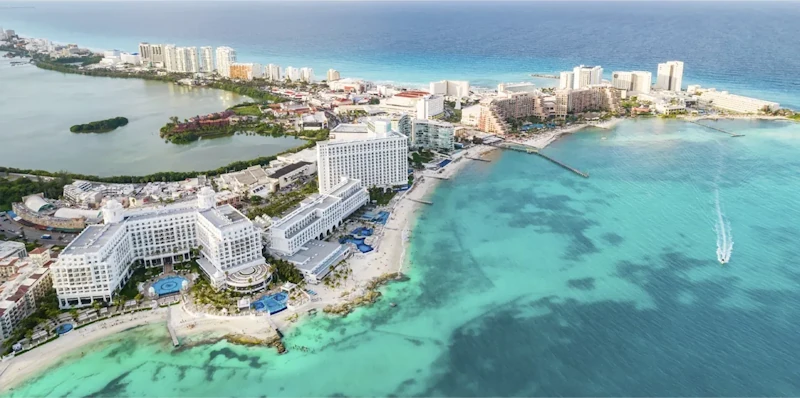
Cancun delivers luxury dental tourism with modern clinics, English speaking staff, and resort partnerships.
Advantages:
- Premium clinic facilities
- Vacation atmosphere and attractions
- International airport access
- All inclusive treatment packages
- Resort and hotel partnerships
Cost Considerations:
- 20 to 30 percent higher than border towns
- Still 50 to 65 percent less than U.S. prices
- Package deals often include accommodation and activities
Best For: Patients combining dental care with vacation, luxury experience seekers, international travelers
Puerto Vallarta and Los Cabos
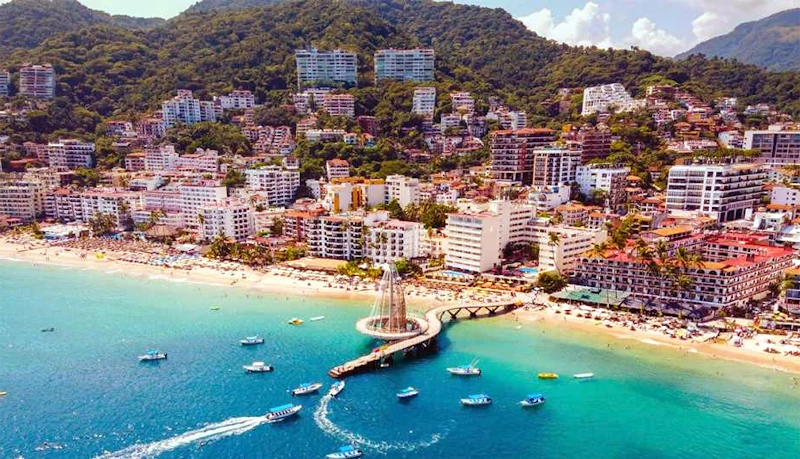
These Pacific coast destinations offer rich cultural experiences and high end dental facilities:
- Puerto Vallarta: 15 to 25 percent above border town pricing, cultural attractions, growing dental infrastructure
- Los Cabos: 25 to 35 percent premium pricing, luxury resort partnerships, exclusive clinic experiences
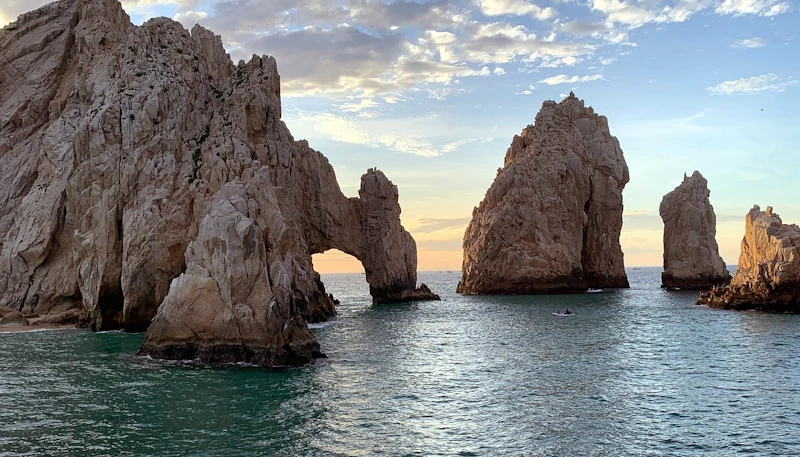
Your choice depends on priorities: maximum savings in border towns versus vacation plus treatment in beach destinations
Planning Your Dental Trip Budget
Build a comprehensive budget so there are no surprises and you maximize your savings from dental tourism in Mexico.
Treatment Costs (70% of Total Budget)
Start with procedure pricing, which is the largest share of your total cost.
Single Procedures:
- Dental cleaning and exam: $85 to $160 total
- Single crown: $300 to $600 plus consultation
- Dental implant with crown: $750 to $1,200 complete
Complex Treatments:
- All on 4 upper or lower arch: $8,900 to $11,000
- Full smile makeover, 10 to 12 veneers: $4,500 to $7,200
- Complete mouth reconstruction: $15,000 to $25,000
Travel Expenses (15–20% of Budget)
Transportation Options:
- Driving to border towns: $50 to $200 for fuel and border fees
- Flights to Mexican destinations: $200 to $800 depending on location
- Ground transportation in Mexico: $20 to $100 per day
Border Crossing Considerations:
- Parking fees: $5 to $15 per day
- Border crossing cards: About $30 for extended stays
- Return documentation: Ensure passport validity
Accommodation Costs (10–15% of Budget)
Border Towns:
- Budget hotels: $40 to $80 per night
- Mid range accommodations: $80 to $120 per night
- Extended stay discounts available
Beach Destinations:
- Resort packages: $100 to $300 per night
- Dental tourism packages often include accommodation
- Vacation rentals: $60 to $150 per night
Daily Expenses and Incidentals (5–10% of Budget)
- Meals: $25 to $60 per day, depending on dining choices
- Local transportation: $10 to $30 per day
- Entertainment and shopping: $20 to $100 per day
Emergency fund: Set aside about 10 percent of the total budget
Sample Budget Breakdowns*
Single Implant Trip (Los Algodones):
- Treatment cost: $900
- Travel (Southern California): $100
- Accommodation (2 nights): $120
- Meals and expenses: $150
- Total: $1,270 vs $4,500 US (72% savings)
All-on-4 Treatment (Tijuana):
- Treatment cost: $10,500
- Travel and accommodation (1 week): $800
- Meals and expenses: $400
- Follow-up visit costs: $300
- Total: $12,000 vs $25,000 US (52% savings)
Smile Makeover Vacation (Cancun):
- Treatment cost (8 veneers): $4,800
- Resort package (5 days): $1,200
- Meals and activities: $600
- Total: $6,600 vs $12,000 US (45% savings)
* These are all estimates, your expenses may vary
Quality Assurance and Value Considerations
High quality care and real savings are possible, but you need research and due diligence when selecting dental clinics and dentists.
Accreditation and Credentials
Dentist Qualifications:
-
Mexican dental degree from accredited institutions
-
Additional training or certifications from U.S. or European programs
-
Membership in professional organizations
-
Documented continuing education
-
Language proficiency for international patients
Clinic Accreditations:
-
Licensing from the Mexican Ministry of Health
-
International accreditation, such as Joint Commission International
-
ISO 9001 quality management certification
-
Recognition programs from the American Dental Association
-
Affiliations with state dental boards
Technology and Equipment Standards: Look for clinics with modern equipment comparable to U.S. standards:
-
Digital X ray and 3D imaging systems
-
CAD/CAM technology for crowns and prosthetics
-
Strict sterilization and infection control protocols
-
Current implant systems from major manufacturers
-
Digital planning and treatment software
Verification Methods
Research Strategies:
-
Patient reviews from multiple sources, Google and medical tourism sites
-
Before and after photo galleries
-
Consultations with multiple clinics
-
Verification of dentist credentials through professional boards
-
Communication with past patients when possible
Red Flags to Avoid:
-
Extremely low prices without a clear explanation
-
High pressure sales tactics
-
Lack of proper licensing or credentials
-
No English speaking staff for international patients
-
Unwillingness to provide references or patient testimonials
Quality Indicators:
-
Clean, modern facilities with current equipment
-
Detailed treatment planning and cost transparency
-
Clear warranty policies and follow up care plans
-
Professional staff experienced with international patients
-
Positive reviews from verified patients
Warranty and Follow-Up Care
Typical Warranty Terms:
-
Dental implants: 5 to 10 year warranties
-
Crowns and veneers: 2 to 5 year warranties
-
General dentistry: 1 to 2 year warranties
-
Full mouth restorations: Comprehensive 3 to 7 year coverage
Follow-Up Care Options:
-
Return visit policies and costs
-
Partnerships with U.S. dentists for routine care
-
Telemedicine consultations for minor issues
-
Emergency contact procedures
-
Documentation support for U.S. dental insurance claims
Continuity of Care: Many Mexican dental clinics now partner with U.S. practices to provide seamless follow up care. Some offer:
-
Shared digital records and treatment plans
-
Coordination with local dentists for routine maintenance
-
Emergency support networks
-
Regular check in communications
Significant cost savings, modern facilities, and an international patient focus make Mexico an attractive destination for quality dental care. By choosing accredited providers and understanding total costs, patients can achieve excellent results while saving thousands of dollars compared to U.S. prices.
Whether you need routine dental work, cosmetic dentistry, or complex procedures like dental implants, Mexico’s dental tourism industry offers compelling value. The key to success is thorough research, a realistic budget, and qualified providers who meet international standards for quality care.
